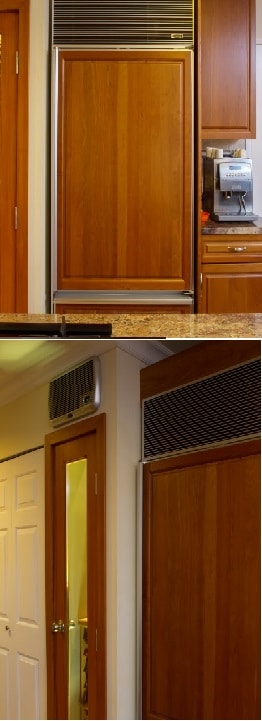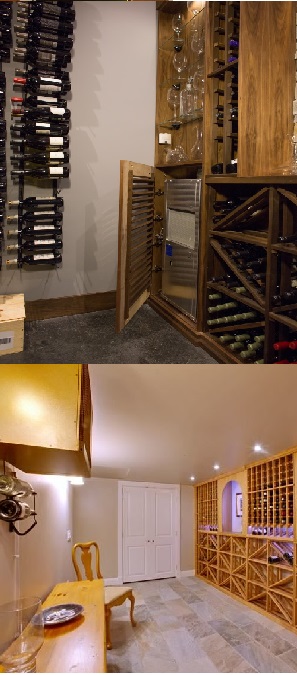A wine cellar cooling unit is an indispensable part of a custom wine cellar, whether for residential or commercial wine storage. A wine cellar cooling unit is necessary to keep the temperature inside the wine storage room steady.
The following are the essential things you need to know when choosing a wine cellar cooling unit for your wine cellar in Vancouver, Canada.
What is a Custom Wine Cellar
Refrigeration Unit?
A custom wine cellar cooling unit is more than just an equipment that circulates cool air around your wine collection. It is a complex system that provides and maintains various wine storage conditions, such as a cool temperature and adequate humidity. Cool air is a vital part of wine storage, but humidity control is also very important, especially for long term wine storage. Wine cellar cooling units are necessary for wines to be kept in the right conditions for years to come.
Do You Really Need to Buy a Wine Cellar Refrigeration System?
Yes, you do. If you care about your wine and your investment in it, then you need to have a wine cellar refrigeration unit installed in your wine storage room. Some people think that, since they already live in a cool climate, they do need to have a wine room cooler. A wine cellar cooling unit is necessary to control the climate inside the wine room, and to make sure it remains at the ideal range for wine storage. Extreme temperatures can damage your wines. If you want to keep your wines safe, and preserve their flavor, you need to invest in a quality wine cellar cooling unit.
Will Any Air Conditioner Do?
Wine Cellar Cooling Systems come in Various Kinds
There are actually various ways to cool wine in a custom wine cellar. Among the options you have in Vancouver, Canada are wine refrigerators, wine coolers or wine cooling systems. These different methods have various purposes. For example, some residential custom wine cellars are kept at the optimal temperature, but not one that is cold enough to serve white wines. In cases like these, a small wine refrigerator is installed inside the custom wine cellar, just to keep white wines ready for serving. Wine coolers or wine cooling systems, on the other hand, are designed to keep your entire home custom wine cellar at a certain temperature.
Some custom wine cellar cooling systems on the market are built with humidity controls, while others are not. Choose a unit that has a humidity control feature, because being able to control the humidity can help keep your wines safe, and ensure that they age properly.
Tips on Buying a Custom Wine Cellar Refrigeration Unit in Canada
There are a lot of things to consider when purchasing a wine cellar refrigeration unit in Vancouver, Canada. A few of the things you need to think about are your budget, and the available space for the unit. Other vital considerations when buying a wine cellar cooling system include the following:
The optimal temperature in a residential wine cellar is be between 55 and 60 degrees Fahrenheit. When choosing a custom wine cellar cooling unit, the ability to provide this temperature range is one of the things that you should consider. A good wine cellar cooling unit not only provides the ideal temperature, it is also able to maintain it with minimal to no fluctuations.
2. Humidity
As mentioned above, humidity plays a very important role in keeping the wine corks intact. A wine storage room that lacks humidity will cause the corks to shrink, and thereby allow oxidation to occur, which will consequently ruin your wines. A wine cellar that is too humid, on the other hand, can cause mold formation, and contaminate your wines. The humidity in a home custom wine cellar should be maintained in a level between 60% and 65%. Therefore, when choosing a wine cellar refrigeration unit, select one that not only maintains temperature, but also controls relative humidity.
3. Venting
Venting is another important consideration when purchasing a custom wine cellar cooling unit. Depending on the design and configuration of the refrigeration system, the unit may need to vent to an adjacent room. If it does, the adjacent room must be air conditioned, so that the heat of the exhausted air may dissipate. There are also cooling systems that are designed and configured to be vented to outside of the house.
4. Type
There are various types of wine cellar cooling units in Vancouver, Canada, and each wine cellar needs a different type. Some wine cellar cooling systems are simply mounted through the wall of the storage room, and exhaust hot air into an adjacent room from there. There are also units that are configured to be ductless. These units have their condensers placed outside, or in an adjacent room. Ductless wine cellar cooling units cause excessive condensation, and therefore need to have a drain. Lastly, there is the ducted type of wine cellar cooling system. This type is one of the best types to use in Canada. They can either be mounted through the wall, or placed in a remote location. If it is placed in a different location, it will be ducted into and out of the custom wine cellar.
Preparing the Wine Cellar for a Wine Cellar Cooling Systems
Since a wine cellar cooling unit is a very important part of a custom wine cellar, it must be installed properly. One cannot install a unit without properly preparing the cellar first. Here are some important considerations to take in order to prepare your wine storage room for the installation of your wine cellar refrigeration unit:
1. Interior and Exterior Wall Insulation
The interior walls of the custom wine cellar must be covered in R-11 insulation, and the exterior walls must be covered in R-19 insulation.
2. Vapor Barrier in the Walls
The wine cellar walls should contain an effective vapor barrier. Vapor barriers are made of polyethylene plastic sheeting, and are installed on the warm side of the wall. Vapor barriers are important, because they serve as the barrier between the wall and the condensation that builds up because of the cooling unit.
3. Vapor Barriers in the Flooring
The wine cellar flooring elements should also have vapor barriers. If the wine cellar floor is made of concrete, you need a vapor barrier with a concrete sealant. Other types of flooring need a vapor barrier and R-19 insulation to protect them from condensation.


